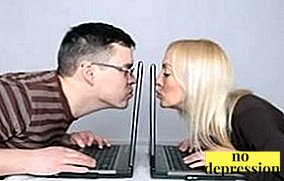Modern neuroscientists say that people simultaneously live in two types of worlds: the physical and the imaginary world of signs. It is possible to touch the physical world, and the invented one exists only in gigantic volumes of the human brain. How is our consciousness formed? What happens in the depths of the brain while studying or playing a musical instrument? Why does one person know more than another? Cognitive is the very word that unites scientists into one team to study brain functions.
The article tells about the cognitive hexagon, distortions and effective ways to develop their mental abilities.
What is cognitive
Cognitive is a multidisciplinary term that unites research areas related to the study of brain functions - knowledge, memory, thinking and thinking, speech and analytical capabilities, conceptual psychological structures. Etymologically, the word "cognitive" is derived from the Latin word cogniscere - know, learn.
Cognitive sciences in their present form make it possible to study the most difficult of areas - human consciousness. This is a growing field of study that combines psychology, anthropology, linguistics, philosophy, neuroscience, and artificial intelligence.
Cognitive function - These are processes in the brain that allow you to receive, accumulate, analyze, save, create and restore information. A key role in these cognitive processes play:
- Executive functions - a set of attention, planning, regulation and implementation of intentional behavior.
- Attention - focus on action, real or ideal object (idea, thought, image).
- Memory - the ability to receive, sort, encode, store and reproduce at the right time received information.
- Speech - communicative ability to express thoughts and speak.
- Imagination - ability to plan, visualize, present intermediate and final achievements.
- Visual-spatial functions - the ability to recover and compare previously obtained information with that obtained in real time (as we recognize familiar faces, similar objects).
History of Cognitive Sciences
People have always been interested in the problems of cognition, memorization, learning and understanding. If we talk about the science of cognitive science, then the work of ancient thinkers can be attributed to the first research in this area. Even the ancient Greek scholars wondered about where human knowledge is stored. Some considered the heart to be the place of accumulation of knowledge, others - the brain.
In his works Plato developed the idea that every organ of human senses is responsible for the discovery of one type of natural energy - light, sound, or any other. Aristotle He assumed that the main accumulator of knowledge of the brain works according to the principle of associations — it unites objects according to the principle of similarity or contrast. Later, during the Middle Ages and the Renaissance, in addition to the well-known five senses, divine sources of knowledge were attributed to the brain.
A surge of interest in the cognitive processes of the human brain arose in the 20-50s of the 20th century. The foundations of a new cognitive science laid in the research of English logic and a cryptographer Alan Turing. Turing was able to prove that complex calculations are performed by repeating the simplest mathematical operations. Thus, he confirmed the theory that thinking is a calculation. There was an idea that you can create a smart machine that can think like a person.
At the same time, the first set of problems of the cognitive sphere emerged - information processing, the structure of the language and its influence on thinking, the development of artificial intelligence and cybernetics. September 11, 1956 at a symposium at the University of Massachusetts linguist Noem Chomsky made a presentation on the impact of verbal behavior on consciousness and ability to learn. This date is considered the official birthday of cognitive sciences.
The cognitive hexagon is the six basic disciplines of cognitive science that are equally important for the study:
- Philosophy - the ability to correctly formulate and ask a question in order to get an adequate answer to it.
- Linguistics - studies speech communication and human speech capabilities.
- Anthropology - helps to know who we are and how we differ from other species.
- Artificial Intelligence - The ability to model human skills.
- Neuroscience - show what happens in the human brain at the time of listening, learning, acting, making decisions.
- Psychology - studies the sphere of unconscious and conscious knowledge, which defines the logic of knowledge.
To cognitive science today also include geneticsstudying the genomes of our prehistoric ancestors.
What is the cognitive sphere of personality and individual abilities of a person?
Scientists give different definitions about the nature of intelligence, but agree on one thing - there is no single answer to this question. Because besides the intellect, there are still concepts of the mind, wisdom, genius. It is impossible to determine intelligence with the help of testing, because it equally depends on the most important processes in the cognitive sphere: memory, logical thinking, imagination and attention. For example, there are people with ingenious mathematical abilities, absolutely incapable of communication.
Conclusion one - the cognitive sphere is formed at all, but each develops it in different ways. If the cognitive abilities are properly trained, the person:
- Faster guided in what is happening and assimilates information.
- Effectively filters incoming information: remembers the necessary and discards unnecessary.
- It analyzes and remembers the original data better, and removes it from memory faster.
- Able to concentrate on the main thing.
- Able to think logically and creatively at the same time.
- It quickly makes the right conclusions, makes important decisions.
That is why cognitive abilities are considered the very basis that determines happiness and self-realization.
How to develop cognitive functions of the brain
Today, much is known about intelligence as a person’s cognitive ability, but there is no single theory. One thing is clear - it is impossible to measure intelligence, but it is possible to test and improve each of the cognitive spheres separately. Moreover, improving one ability has a positive effect on others.
How to develop memory
It turns out that memory can be pumped up with special exercises, like muscles in a gym. Here are 3 non-dull ways to improve memory without additional load:
- Laugh more. A little humor in the body will reduce the level of stress hormones, reduce pressure, lead to a good mood. As a result, this combination will refresh the ability to memorize.
- Get enough sleep. During sleep, new connections are formed between neurons, and information is transferred from short-term memory to long-term memory. As a result, a full sleep will help prepare for the exam better night cramming.
- Write by hand. The traditional way of taking notes develops fine motor skills. In addition, before taking notes on paper, we mentally structure the material, train the memory. As a result, a handwritten summary leaves more memory in memory than a thoughtlessly recorded lecture on a tablet.
So, you slept, laughed and tuned in to effective memorization. But just reading the material does nothing. It is necessary to do it "wisely", using scientific methods of working with large volumes of information:
Concentrate. Attention and memory are interrelated. Favorable conditions are needed for memorization, otherwise the information obtained simply will not reach the necessary memory departments. So turn off the loud music, TV, phone and focus on the tutorial. Otherwise, no effective memorization strategy will help.
Repeat intelligently. Repetition is a classic way to absorb material. But senseless cramming does little good. Therefore, apply additional efforts to consolidate: add a rhythm, speak out loud, retell the material to another person in your own words.
Structure. Division into categories, grouping, identification of patterns, division of information into groups from a subgroup is the creation of a solid framework on which knowledge will hold. The main goal of structuring is to simplify information about the main elements and come up with patterns. Therefore, use memory mechanics or mental memory cards of Tony Buzan.
How to train attention
Exercises to train attention is good, but not enough. Because attention is not an isolated muscle that works on its own, it interacts with other “muscles”. It is difficult to concentrate if you are tired, alarmed or upset. Therefore, for effective concentration requires special conditions:
Give previous thoughts or experiences to digest.. No wonder there is an expression "make a fresh head"That is, to start a new business in the morning, in a cheerful state or after a rest. Therefore, before starting a new task, you need to spend 15-20 minutes alone and let your previous thoughts digest. Or alternate work of the brain with exercise.
Focus on one task. Unfortunately, multitasking often negatively affects concentration. Simultaneous execution of several processes reduces the effectiveness of each - when the brain constantly switches the focus of attention, it quickly gets tired. Therefore, begin to train your concentration on everyday matters - focus on the taste of food during meals or on the work of one muscle during exercise.
Get rid of irritants. This is how our brain works - it is constantly distracted by sounds, pictures, movement. It is impossible to get rid of all, but most of them will succeed. Therefore, before work, turn off the sound on the phone, Skype, notifications from the mail. At work, try to organize a comfortable workspace, ask colleagues not to bother with questions for some time.
How to develop crazy creative and imagination
Creativity cannot be turned on with a button, but it can and should be developed. There are 3 unexpected ways to develop and enhance creativity:
Do not wait for your own inspiration. Creativity is available to everyone and everyone, and to start creating you do not need to be a genius. In the world, there is nothing completely original, so at the beginning of your creative journey feel free to copy other people's masterpieces, collect ideas. A spark of inspiration will come with experience, so follow your interests and boldly disclose the creative "I".
Keep a mobile diary of inspiration. Throughout the day we are visited by many thoughts. Some leave indifferent, but some catch. Unfortunately, when we try to remember something, especially valuable ideas are lost forever. Therefore, get a small notebook of A5 size and take note of interesting thoughts during the day.
Look for new experiences. New impressions give new emotions. Emotions reveal internal resources. To get new impressions it is not necessary to go to an exotic country or jump with a parachute. You can stop at less radical ways. So please yourself with new recipes, start drawing or playing a musical instrument, decorate an apartment or participate in a festive event.
What inhibits cognitive development
We all perceive the world around us individually: the same sounds and colors cause different associations, in some conditions we make different decisions. At the same time, we make mistakes related to cognitive distortions and we don’t even realize. There are a lot of systemic thinking errors.
Each cognitive distortion the brain uses with a certain meaning - mainly to give an automatic, irrational answer and convince us of its correctness. When we give in to the manipulation of our consciousness, we:
- We strengthen negative and ignore the positive aspects of what is happening.
- Generalizeusing one bad piece of situation.
- Offended on the injustice of life, when the situation is not in our favor.
- Countthat less than the others are subject to manipulation.
- We waitthat the surrounding will be improved in accordance with our expectations.
- We hang shortcuts to yourself or others after unpleasant events.
- Provingthat our beliefs, conclusions, actions are the most correct.
To fight this is pointless. But you can find out the reasons why the brain does it.
Reason 1: Information overload.
Today, not only people looking for information. But information is looking for a person. In order to distance itself from information noise, the brain filters out only what it has already memorized. Therefore, we pay attention to familiar details, while reading books we skip over familiar words, skip information that does not seem unusual.
Reason 2: Lack of meaning.
We are able to see only a tiny part of the general information, but are forced to analyze this data in order to survive. The brain fills the gaps with its findings and existing knowledge, creates false memories, illusions. Therefore, we rely on stereotypes, project previous experience on the future, forget information that does not fit into the usual patterns.
Reason 3: Forced speed of action.
Like a computer, our memory is able to pass through a limited amount of information. So that the amount of information does not slow down the work, the brain learns to act in conditions of uncertainty. Therefore, we make the most simple and understandable decisions, prefer to do the usual things, rather than study new ones, we value things more in the present than in the future.
Reason 4: Deciding what information will be useful in the future.
The brain records everything that gets into it, but does not always use this knowledge. In order to recall information at the right moment, the brain constantly makes a decision: what to write to the near or far memory regions. Therefore, we remember a few vivid details, but we forget the rest, edit the events of the past, summarize and cannot remember what we thought a minute ago.
Cognitive distortions are brain functions that are useful in some situations and harmful in others. Knowing how the brain functions, we can better understand ourselves and use its features to our advantage.
How to speed up cognitive development with games
It is believed that the game - only for children or irresponsible teenagers. But this opinion is outdated. With the help of games you can train your memory, imagination, pump over logic and change reality. Not computer, but vital.
Here are 3 scientific facts that will help revise your opinion about the games:
Games improve cognitive processes. During the game, dopamine is actively produced in the gamer's brain, which increases the amount of gray matter in the hippocampus, the memory area. A larger volume of gray matter increases the brain's cognitive resources, which can be directed to learning, motivation, and self-knowledge.
Games help to cope with traumatic experiences. Psychiatrists have proven that the simplest game helps to reduce the amount of memories after the tragic events. This effect will help after hard work. To relieve stress, stop thinking about something unpleasant, it’s enough to play for 10-15 minutes in the evening.
Games develop. Modern games have evolved into complex systems that increase the plasticity of the brain and its cognitive abilities in general. But here it is worth making a reservation - not all games are equally useful. Avoiding reality is not the most effective strategy. But the strategy of self-expanding immersion helps to focus on your desires and positive thoughts.
findings:
- The term "cognitive" means an interdisciplinary synthesis of sciences connected by a single problematics, mind-brain-knowledge.
- Everyone has mental abilities, but each develops differently.
- Cognitive spheres of personality are interrelated. Improvement in one automatically pumps the rest.
- Cognitive distortions are brain tricks with which he justifies our errors or mistakes.
- Challenging games and strategies are a great way to increase brain plasticity.



